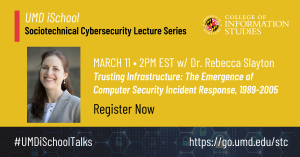Events
STC Lecture Series: Rebecca Slayton
Event Start Date: Thursday, March 11, 2021 - 2:00 pm
Event End Date: Thursday, March 11, 2021 - 3:00 pm
Location: Virtual
STC Lecture Series: Trusting Infrastructure: The Emergence of Computer Security Incident Response, 1989-2005
Register for this Event

Abstract:
Historians have tended to analyze maintenance as an intrinsically local activity, something very unlike the development of large technological systems. This article challenges this historiographic dichotomy by examining efforts to construct a global infrastructure for maintaining computer security. In the mid-1990s, as the internet rapidly grew, commercialized and internationalized, a small community of computer security incident responders sought to scale up their system of coordination, which had been based on interpersonal trust, by developing trusted infrastructure that could facilitate the worldwide coordination of incident response work. This entailed developing not only professional standards, but also institutions for embodying and maintaining those standards in working infrastructure. While some elements of this infrastructure became truly global, others remained regionally bounded. We argue that this boundedness resulted not from the intrinsically local nature of maintenance, but from the historical process of infrastructure development, which was shaped by regionally based trust networks, institutions, and needs.
Speaker:
Dr. Slayton is an Associate Professor in the Department of Science and Technology Studies at Cornell University. Dr. Slayton’s research and teaching examine the relationships between and among risk, governance, and expertise, with a focus on international security and cooperation since World War II. Some of her recent work includes two book projects supported by a five-year NSF CAREER award, “Enacting Cybersecurity Expertise.” Shadowing Cybersecurity, examines the emergence of cybersecurity expertise through the interplay of innovation and repair. The other book, in progress, examines tensions intrinsic to the creation of a “smart” electrical power grid. Dr. Slayton received the United States Presidential Early Career Award for Scientists and Engineers, for her NSF CAREER project. She was an AAAS Mass Media Science and Engineering Fellow and previously worked as a science journalist. Dr. Slayton earned a PhD in physical chemistry from Harvard University.